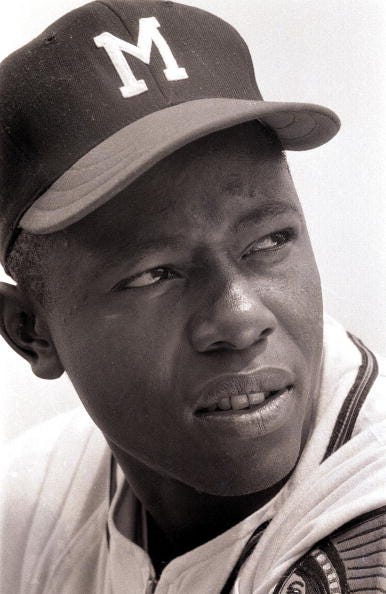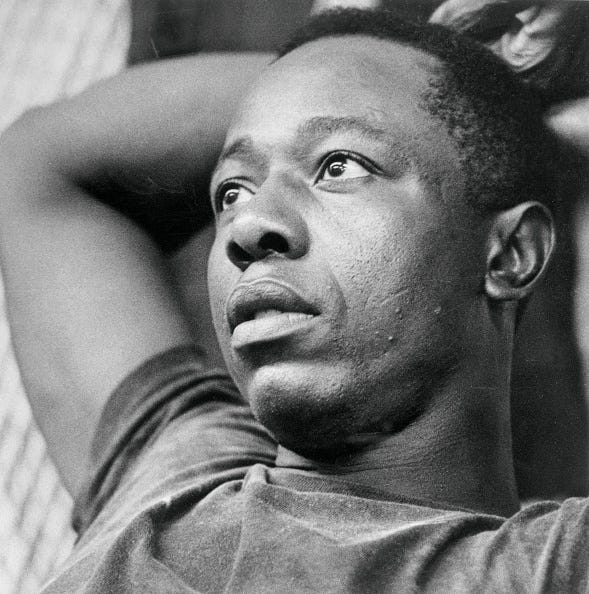When you are a child, simple truths from an adult are a kind of a miracle. You want there to be someone up there who can clarify the way life really works. Or, at least, you want to find some realm of life where adults and kids can speak the same language and mean the same things.
When I was a boy, that realm was baseball, and the man who shared simple truths was Henry Aaron. I don't mean personally; I mean from the biographies and the sports books that I checked out from the library and kept or lost under my bed. He said to always watch the pitcher. Keep your eyes on him all the time. Follow his delivery, time your swings. As a kid who could never focus on anything, this idea of concentration was a revelation. He also said to always have a bat in your hands. Keep swinging a bat. Maybe two or three for strength. But always have a bat with you, keep swinging that bat. This was a simple gospel. I could do that.
As a boy playing baseball, I didn't think about talent. I thought about numbers, and Henry Aaron had beautiful numbers. Between 1957 and 1973 he hit between thirty and forty-seven home runs every year. He hit forty-four home runs four times; at that point the regularity became magical, because 44 was his number. He broke Babe Ruth's home run record (714) by being consistently great.
I was born in 1969, so my Aaron was mostly retrospective, from reading. I did have his baseball card, from the final year of his career, with the Milwaukee Brewers in 1976. That he had ended up in Milwaukee seemed like a kind of magical harmony. As a kid I knew the names of American cities through sports. I hadn't been anywhere, but I had read books. I knew that Milwaukee was where Hank Aaron had played first, and that the Milwaukee Braves had then moved to Atlanta. Milwaukee and Atlanta were just names to me as a kid, as exotic as Timbuktu or Constantinople, except that they were in my country. Thanks to the biographies, I knew that Aaron was from Mobile, and the Mobile was in Alabama, and that there was something hard about being a black person from Mobile, Alabama. Something maybe that stayed with you after you left Mobile, Alabama. It was a little vague in the books.
Aaron broke Ruth's home run record on April 8, 1974. I remember watching the video of this, with the number 715 in blocky yellow letters. This must have been a replay on one of the Sunday-morning sports shows a couple of years later. When you hit a home run, you trot around the bases. By the time I saw it on video, I had read about that particular run around the bases that day from Aaron's point of view.
As Aaron rounded second base, two men jumped from the stands and chased him. He did not know what they intended. He said that he didn't know if they were going to attack him or wish him well. He just kept jogging until he crossed home plate. I asked my father about this, and he said that Aaron had reason to be afraid. Now we know more about this. Aaron got nearly a million pieces of mail during his chase for Babe Ruth's record, much of it threatening. Some of the threats were very specific.
There are moments when a child realizes why the adult world seems so blurry. It is not just distance. It is that there is no adult world. Babe Ruth was white, and Henry Aaron was black, and no adult American, white or black, was untouched by this. And of course, it eventually dawns, no American child is exempt, either. No black boy would have had to ask his father why Henry Aaron would have been afraid of two white men running after him right after he had hit his 715th home run.
From Henry Aaron I learned about concentration and about persistence. Even if you think you know what to do, you look closely. Even if you are good, you never stop practicing. Going through the motions is a good thing, not a bad thing. It took longer to see the lesson in courage. That takes a while to sink in. It is still sinking in.
I have long wanted to write a book about baseball and America. I know the game. I can read the European languages, and I wanted to see how the stories of the Italians, the Irish, the Germans, the Poles, the Jews looked from the other side of the Atlantic as well as here. I wanted to end with Roberto Clemente and Henry Aaron. My idea was to treat the integration of black players as the final chapter, after the integration of the Jews and the hyphenated Europeans. I wanted to write about Aaron rather than about Jackie Robinson, because I had the idea that baseball, in some meaningful sense, was integrated on April 8th, 1974, when Babe Ruth's record was broken and Henry Aaron survived.
That seems naive to me now, or premature. Vin Scully, who called that Dodgers-Braves game, said after the home run: “What a marvelous moment for our country and the world. A black man is getting a standing ovation in the Deep South for breaking the record of an all-time baseball idol.” Aaron hit that home run against a black pitcher, Al Downing. That year, about seventeen percent of major league baseball players were black, and black players were contributing more to their teams than were white players. For at least some white kids, the ballfield was where you could have a black hero: in southwestern Ohio in the middle of the 1970s, say, that might have been Joe Morgan, the best player of those years, or George Foster, the only man to hit fifty home runs in a season that decade. Today the percentage of black players in the major leagues figure is below eight percent.
In 1976, Hank Aaron retired from baseball, and America celebrated its bicentennial. The postal service issued a stamp of the Liberty Bell, quoting the biblical verse inscribed upon it: “Proclaim liberty throughout all the land unto all inhabitants thereof” (Leviticus 25:10). That bell was not actually known as the Liberty Bell when the country was founded. Abolitionists who gave the State House bell in Philadelphia that name decades later. How will that bicentennial year look to future historians: as a time of racial progress, or as the beginning of a new era of racial oppression? It is too soon to say; or, rather, the answer depends upon us. Listening again to Vin Scully’s call of that home run, it is hard not to think of what came after: on the one side, extraordinary individual achievement, including the election of an African-American president; on the other, the mass incarceration of the 1980s, 1990s, and 2000s, the return of voter suppression after 2013, the parading of the confederate battle flag though the U.S Capitol on January 6th, 2021.
Henry Aaron died sixteen days after that. In later life, he said that he didn't want people to forget Babe Ruth, he just wanted them to remember Henry Aaron. That is the right kind of challenge for Americans thinking about our history. History is not about leaving things out, or rooting for your own side. It is not about fearing that others will displace you, and writing from your fears. It is about concentrating and practicing, about seeing more, working more in, making your imperfect perspective less imperfect.
I owe a lot to Henry Aaron, including those wise words. If I ever write my baseball book, and if it is any good, that will also be thanks to Henry Aaron.







I love baseball--always have and I'm old. When I was a child in a small town in Michigan, families would get together for the Saturday night baseball game. I don't know when baseball stopped being the American sport and we switched to football, which I find unbearable to watch because the people out on the field brutally attack each other and pile up more injuries that will bring them to grievous harm later in life. People tell me that baseball is too slow but it's not if you are thinking through the next moves while nothing appears to happen as you would when watching a chess game. I love baseball but football does reflect these cold, brutal times in the U.S. far better than does baseball.
Hank Aaron was something special. Looking forward to your book about it!
https://www.al.com/sports/2015/05/watch_hank_aaron_on_the_third.html
https://www.mlb.com/news/hank-aaron-covid-19-vaccination
https://www.cbssports.com/mlb/news/hank-aaron-compares-republicans-who-oppose-obama-to-kkk/
https://www.youtube.com/watch?v=m03bFB0vmFA